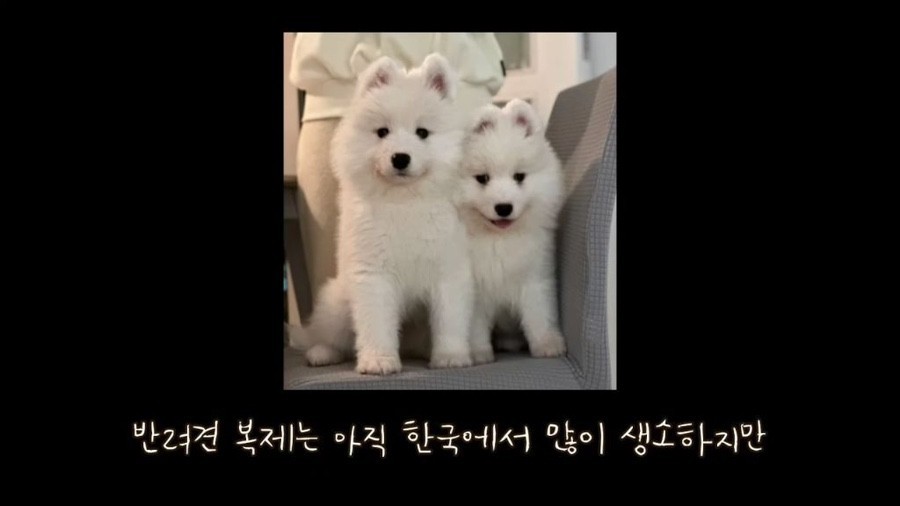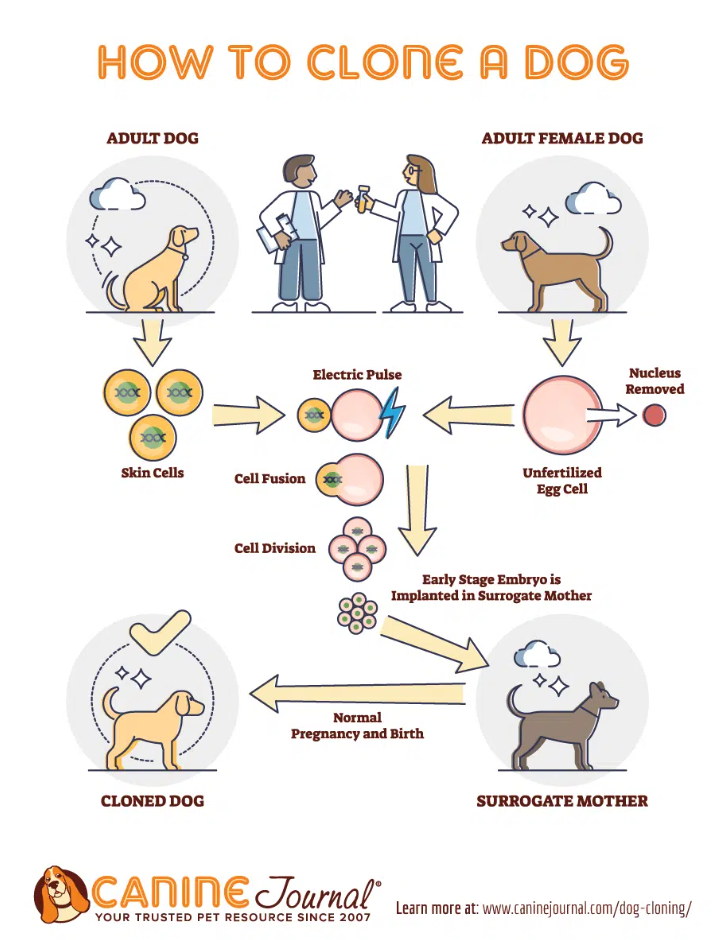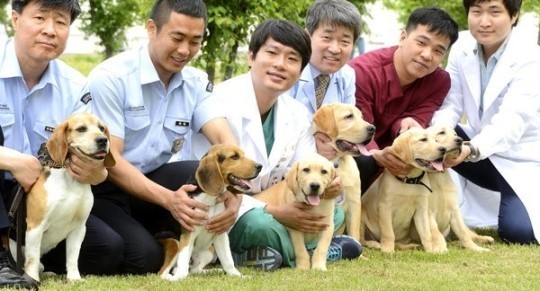Recently, YouTuber ‘Samoyed Tico’ sparked controversy by posting a video titled “Our Dog is Back,” in which she revealed that she had cloned her deceased pet. The YouTuber explained that after the sudden loss of her beloved pet, she decided to bring it back through a clone. While some sympathized with the pain of pet loss, controversy grew as more people learned about the process of dog cloning. Dozens of dogs, including egg donors and surrogate dogs, are sacrificed to produce a cloned dog. The issue of animal cruelty surfaced when people became aware of the fact that the dogs used in the cloning process are disposed of when the procedure is complete. Additionally, it was disclosed that anyone can clone a pet by paying 80 million won, raising ethical concerns about treating animals as commodities.
 |
| ▲ Tico's Cloned Dogs (Photo from Youtube channel ‘Samoyed Tico’) |
Dog cloning is a form of somatic cell cloning. During this process, an egg donor dog and another mother dog, known as a surrogate, are required. The cell nucleus of an egg collected from the egg donor dog is combined with that of the original dog. Cloned puppies are then born when the substituted egg is implanted in the womb of the surrogate mother dog. However, somatic cell cloning requires tremendous technical skill and experience. Current technology requires, 5 to 7 eggs to be collected due to the high failure rate, and it can take up to three times for the egg transfer process to be successful. This means the egg donor dogs inevitably suffer from the artificial stimulation of their ovaries through hormone treatment and the collection of eggs by surgical operation. Surrogate dogs also need artificial hormone supplementation for embryogenesis, and they have a higher risk of complications or death compared to dogs born naturally. Even after performing such a complicated process, the genes of the original dog are not perfectly cloned. The main point of somatic cell cloning is the replication of ‘nuclear DNA (nDNA),’ but the DNA of mitochondria is also cloned along with nDNA during the process. While nDNA is inherited from each parent, mitochondria DNA is maternally inherited. Therefore, the mitochondrial DNA of the egg donor dog rather than the original dog is often copied and passed down. As a result, dogs that go through this process are cloned dogs with 0.005 percent difference in DNA.
 |
| ▲ The Process of Dog Cloning (Photo from Canine Journal) |
Three main controversies have arisen related to animal cloning. The first is the violation of bioethics. The fact that animal cloning allows for the reproduction of living beings for profit, rather than for scientific research purposes, has sparked significant debate. Furthermore, it is controversial when cloning companies claim that they can re-clone or provide after-sales service if there are issues with the cloned animals. Some argue that treating dogs as commodities rather than living beings is ethically problematic. The second controversy is related to overcoming pet loss syndrome. Pet loss syndrome refers to the feelings of loss and depression experienced after the death of a beloved pet. Despite ethical concerns, some argue that cloning can help overcome the grief of losing a pet, as the cloned animal may evoke a sense of empathy. However, there is also a significant backlash against the idea of using such unethical means to cope with pet loss. The Animal Freedom Union has stated that animal cloning of this nature indicates that human selfishness has gone beyond the boundaries of bioethics. Even if one chooses cloning to cope with the loss of a pet, it cannot be said that the cloned animal perfectly matches the original pet in terms of different temperament and characteristics. The final controversy is the lack of legal regulations. The existing Animal Protection Act only regulates animal experimentation for research purposes, and there is no legal framework or supervision for commercial purposes such as cloning pets. The Animal Freedom Union has reported the unlicensed production and sale of cloned pets to the police, but there is currently no effective way to punish such companies solely based on cloning, prompting the Union to file charges for the unauthorized production and sale of companion animals to hold them legally accountable. It is clear that there is a need for discussions on amending laws to determine how animal cloning should be managed and supervised.
 |
| ▲ Dogs Born by Special Purpose Dog Cloning Project in South Korea (Photo from Kyeonginilbo) |
South Korea holds a unique position in the arena of animal cloning, earning the moniker "the country of cloned dogs" from the renowned French daily La Croix, reflecting its active involvement in this controversial technology. The Rural Development Administration's (RDA) Special Purpose Dog Cloning Project, launched in 2007, is one driving force behind this leadership role. This initiative aims to leverage somatic cells from proven detection and search and rescue dogs to create clones with their exceptional abilities. This strategy appears to be successful, with cloned dogs constituting a staggering 82.3% of the Animal and Plant Quarantine Agency's drug detection force at airports. Cost reduction serves as a key motivator for utilizing cloned special-purpose dogs. Training a regular dog for such roles boasts a meager success rate below 30% and incurs significant costs, reaching around 130 million won. Conversely, cloning offers an 85% success rate and a more affordable price tag of approximately 80 million won, representing a cost savings of nearly 65% compared to traditional training methods, as claimed by the RDA. Despite the economic benefits, critics emphasize the lack of concrete evidence supporting the claim that cloned dogs possess the same level of proficiency as their original counterparts. Beyond the ethical concerns, another critical aspect is the absence of a legal framework governing the use of cloned dogs in South Korea. While the technology's applications have flourished, there remain no regulations or restrictions in place. This legislative vacuum has spurred calls for action, urging the comprehensive management of cloned dogs, including addressing issues like commercial cloning for profit and strengthening animal ethics awareness. The lack of oversight raises concerns about potential exploitation and ethical breaches, emphasizing the need for a solid legal framework to ensure the responsible and humane utilization of this technology.
As animal cloning has advanced and become more widespread, there is an urgent need for strict and clear guidelines regulating the practice. The government should impose stringent restrictions and punishments for cruelty involved in commercial cloning, and the public should cultivate a clear awareness of animal ethics regarding this issue. While those who have lost their pets will require ample time to accept their pets’ deaths, commemorating them in appropriate ways can aid in overcoming pet loss. This approach will contribute to a healthier society for people and a more humane treatment of our dogs.
배서연, Thao, 박상우, 이채현 dankookherald@gmail.com






